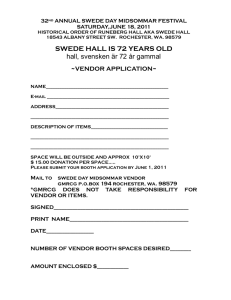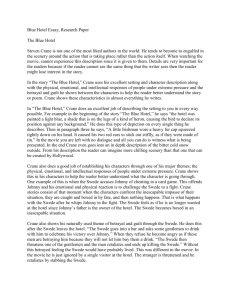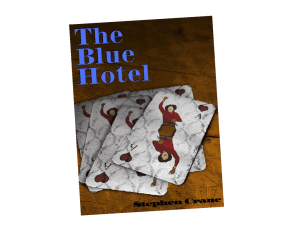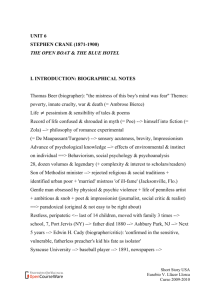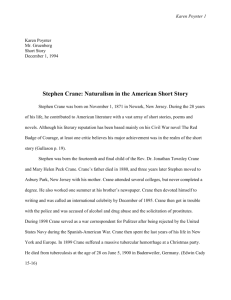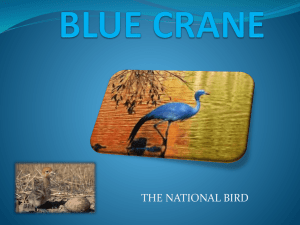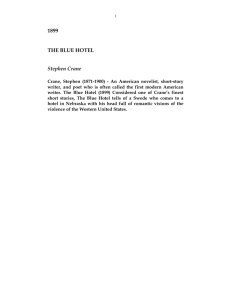'The Blue Hotel' and The Ideal of Human Courage
advertisement
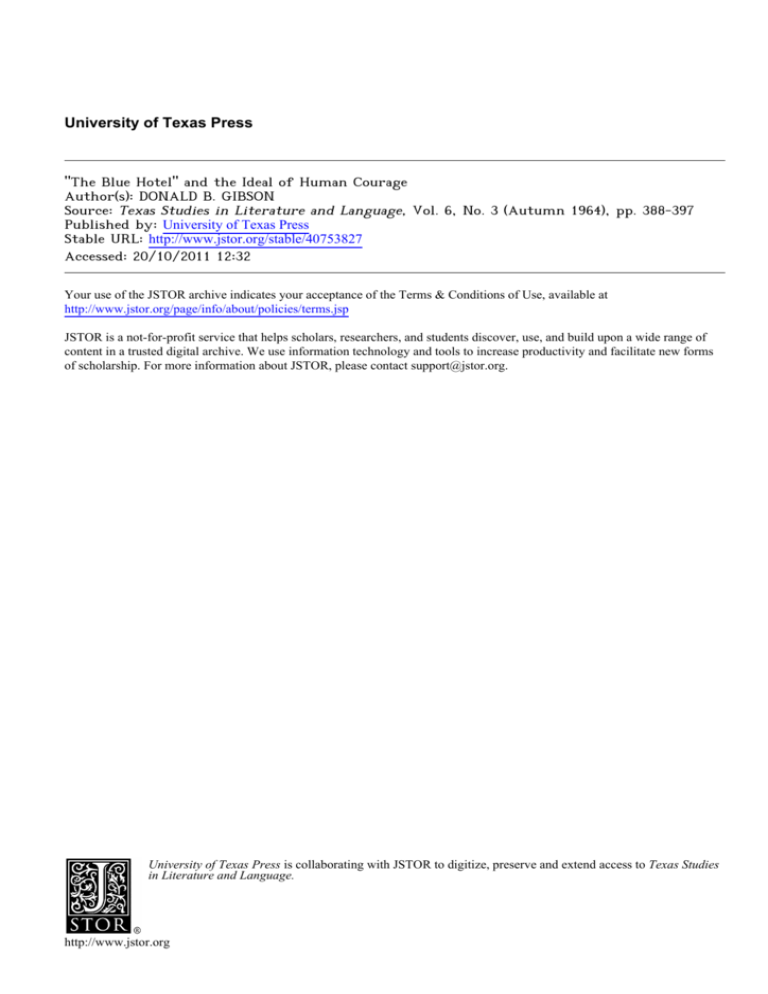
University of Texas Press "The Blue Hotel" and the Ideal of Human Courage Author(s): DONALD B. GIBSON Source: Texas Studies in Literature and Language, Vol. 6, No. 3 (Autumn 1964), pp. 388-397 Published by: University of Texas Press Stable URL: http://www.jstor.org/stable/40753827 . Accessed: 20/10/2011 12:32 Your use of the JSTOR archive indicates your acceptance of the Terms & Conditions of Use, available at . http://www.jstor.org/page/info/about/policies/terms.jsp JSTOR is a not-for-profit service that helps scholars, researchers, and students discover, use, and build upon a wide range of content in a trusted digital archive. We use information technology and tools to increase productivity and facilitate new forms of scholarship. For more information about JSTOR, please contact support@jstor.org. University of Texas Press is collaborating with JSTOR to digitize, preserve and extend access to Texas Studies in Literature and Language. http://www.jstor.org DONALD B. GIBSON "The Blue Hotel" and theIdeal ofHuman Courage THOUGH "THE BLUE HOTEL" HAS BEEN ACCOUNTED ONE OF THE BEST has thingsthatStephenCrane did, themeaningof thatperformance been as variouslyinterpreted as the meaningof The Red Badge. A numberof criticshave seenthetale as havingas itscentralthemethe seems brotherhood ofman: againsta universe whichin itsindifference man can onlymaintainorderand meaningin hostileand malevolent, as a linkin "the his lifeif he recognizesand fulfills his responsibility chain of Somehave seenthetale as meaningwe humanity." magnetic are determined thatthecomplexity ofhumanbehavioris so creatures, that greatand our knowledgeof whatgoeson aroundus so imperfect we have no controloverourdestinies whenwe are involvedwithother humanbeings.If the formerstatement is the theme,thenwe are all for and each If thenno oneisresponsible. to other. the latter, responsible Needlessto say,thesetwopossibilities Yet thereseems are antithetical. to be in thestoryevidencesufficiently to demonstrate to nearly strong all criticsthe truthof one of thesepropositions. The bestsupportof istobe foundintheconclusion. eitherposition Let us assumeforthetimebeingthatthestoryintendsto pointout thatwe are determined victimsof an inexorablenecessity, creatures, no control over our fates. Whathappenswhenwe examine exercising neartheend ofthestory? thefamousspeechoftheEasterner We are all in it! This poorgamblerisn'tevena noun.He is a kindof adverb.Everysin is the resultof a collaboration. We, fiveof us, have ofthisSwede.Usuallythereare froma dozen in themurder collaborated to forty womenreallyinvolved inevery butin thiscaseitseemsto murder, old Scully;and thatfoolof an unbe onlyfivemen- you,I, Johnnie, the apex of a human fortunate gamblercamemerelyas a culmination, andgetsall thepunishment. movement thegamblerto a partof a syntactical The analogylikening structure, basic word ratherthan to a word determining and to a modifying a or that like control noun the had little verb, gambler suggests meaning, overhis fateand theSwede evenless.As an adverbhe is meaningless untilhe becomesattachedto someverb,adjective,or otheradverb It is quiteclearin retrospect thathad whichwillallowhima function. thenthegamblermostlikely theeventsat thehoteloccurreddifferently, "TheBlueHotel"andtheIdeal ofHumanCourtge 389 wouldnot have been intimidated by the Swede and wouldnot have no controloverwhathappened killedhim.The gamblerhad absolutely as a culmination, theapexof at thehoteland inthissensecame"merely and gotall thepunishment." The Swedediesbea humanmovement Had he chosento grab cause of hislimitedand imperfect knowledge. but the he wouldnothavebeen the table man at gambler, probably any It wouldseem,as one critichas so ablyput it,thatCrane murdered. shownthatmen'swillsdo notcontroltheirdestinies."1 "has absolutely But whathappensif we look at thelast sectionfromthepointof involvviewofone whowouldsee themeaningofthetaleas primarily that it obvious man theme? First of all of is brotherhood the quite ing that all intends to intentions the Easterner of Crane's say regardless forevil,thatfacedbya universe mensharetheburdenofresponsibility of his whichhas no regardforhim,man mustrecognizethenecessity withothermen.Seen fromthisvantagepoint,theEastinvolvement "The Swedemightnothavebeenkilledifeverything erner'sstatement, out difoftheactionturning had beensquare,"impliesthepossibility further fromthewayitdid.WhentheEasterner says,"Johnnie ferently to standup and be a man. was cheating.I saw him.. . . And I refused I let theSwedefightit out alone.And you- youweresimplypuffing aroundtheplace and wantingto fight.And thenold Scullyhimself! to pointoutthe We are all in it!" he meanstheindicateresponsibility, and whose that the clear here It is also cowboy, experience quite guilty. is intendedto presentthelesssatisfactory are quitelimited, sensibilities thelastscene.He failscompointofviewtowardtheeventspreceding about Easterner's statement of the the to pletely comprehend meaning the of Swede. men in the of thefive murder the complicity "Well, I did I?" he asksnaively.It seemsclearenoughthat didn'tdo anythin', ofwhatthe theanswertothecowboy'squestionwouldbe a restatement towardeach has said already,thatmenhave responsibility Easterner ofman. other;hencethethemeofthebrotherhood action thepreceding statements NowiftheEasterner's truly interpret toward of humanbeingsactingresponsibly thenecessity as indicating each otherand ifone feelsthatthestoryshows"thatmen'swilldo not mustbe made thensomekindof adjustment controltheirdestinies," One are since alternatives exclusive. two the between mutually they comthe Easterner's is with the problem bydiscounting wayofdealing to do because Thisto meseemsimpossible mentsat theendofthestory. betweenthe I detectnothingtherewhichwould indicatea disparity One anxious and Crane'sattitudes. attitudes bytheEasterner expressed 1 Charles C. Walcutt, American Literary Naturalism: A Divided Stream (Minneapolis,1956), p. 75. 390 DONALD B. GIBSON criticgoesso faras to saythat"theEasterner's speechis swellingwith seems to me erroneous and half-truth."2 This an entirely self-importance a far thanit last more the of section, readingcreating problems reading solvesbecausewe have thento deal withthecowboy'sreactionto the Crane'sattitudeis notthesameas the Easterner's speechand certainly is to the There no reason interprets cowboy's. suspectthattheEasterner precedingeventswrongly. Anotherway of "proving"thatthe themeof the storyis not the the finalsectionas being"tacked themeis by dismissing brotherhood thattheconclusionis "tackedon" on." The inadequacyofthetheory becomesimmediately apparentwhenwe considertheextentto whichit it was neceshas been preparedforbytheprecedingaction.Certainly intention whatever that was were to be that if Crane's fulfilled, sary, the readerknowthatJohnniehad in factcheatedin the card game. to learnthis,it is nota shockifwe remember Thoughwe are surprised to thehotelwith thatat thebeginning ofthestory, whenScullyreturns the new guests,Johnnieis playingcardswitha farmer.The twoare when theyare playingHigh-Five,the arguing.Shortlyafterwards theplay gamebeingplayedlaterwhenJohnnieis accusedof cheating, is again stoppedby an argument:"The playofJohnnieand thegraybeardwas suddenlyendedbyanotherquarrel.The old manarosewhile He slowlybuttonedhis castinga lookofheatedscornat hisadversary. fromtheroom."We do not coat,and thenstalkedwithfabulousdignity knowwhatthetwoare arguingabout,butit is notdifficult to imagine thatthefarmerhad seenJohnniecheat,but,knowingthecode ofthe West,didnotdareaccusehimdirectly. It oughtalso be consideredthatthe characterof the Easterneris such thathe mightverywellkeep silentabout seeingJohnniecheat. He is a meekman. It is he whois mostaffected bythecold,and itis he and theSwede.He is toprevent thefight betweenJohnnie whoattempts the least outspokenamongthe men in the story,and he is the least movedby the curiousresponsesof the Swede .His primary strongly ofanykind.Too, he is shownto seemsto be to avoidconflict intention it that individual be a sensitive enough mightindeedoccurto himthat fortheoutcomeofthe he and theothersare to somedegreeresponsible centralactionofthetale. are havingtheircakeand eatingit Thosewhodismisstheconclusion toobecausepriorto thelastsectionthereis littleto suggest determinism, These criticshave or that"men'swillsdo notcontroltheirdestinies." of thelast section.The error takenone of thepossibleinterpretations 2 Stanley Greenfield."The UnmistakableStephen Crane," PMLA, LXIII (December, 1958), 562-572. "The Blue Hotel" and theIdeal ofHuman Courage 39 1 to see in Crane's comesaboutas a resultof our too greatwillingness whichreallyisn'tthere.His writingis as worka kindof consistency insomeofhis be. Becausewe seedeterminism variedas itcouldpossibly he did. He earlierworkwe shouldnotexpectto findit in everything workedthisproblemoutin Maggieand The Red Badge and neverrewhohaveseenfitto givesupportto the turnedto itagain.Thosecritics Hotel" showsthatmendo notcontroltheir that Blue "The assumption destinies havelittlemorethantheweatherto pointto as proofoftheir that sincethe weatherservesas such a claim.They feelapparently men's forceon the activitiesof men that it determines constricting them.The onlyothersupportforthisposiactionsratherthanlimiting sectionis thefactthatthereexistsa causal tionpriorto theconcluding relationbetweenwhathappenedat thehoteland the Swede'sdeath. But inevitable. It wouldseemthatthemurderwas an act ofnecessity, is thisreallysayinganymorethanthatin fiction plotusuallyproceeds Is it nottruethatin everyworthwhile fromcharacter? pieceoffiction and event? thatthereis a causalrelationbetweencharacter everwritten In thesamemannerthatwe can showthattheSwede'sdeathoccurs is deterministic. But this we can showthatmostfiction outofnecessity whichintendto prove thanare thosearguments is no moresatisfactory creatures. thatweinlifearedetermined themeis developedduringthe the brotherhood On theotherhand fromthe Easterner's but in a way different courseof the narrative, of the meaningof what has occurred.The Easterner interpretation thateach of us shouldbe his brother's keeper,yetthe story suggests an solutionifwe mean not in itself view is that that adequate implies would have solution" whatever preventedthe Swede's by "adequate to protectthe death.Scullydoesall withintherangeofhispossibilities between himand the his to conflict to alleviate fears, prevent Swede, occursand the Swede is eventually murothermen.Yet the conflict dered.Even afterthe Swede has had a drinkand becomesmostobfortheSwede's noxiousScullyadmitsbyhismanner"hisresponsibility newviewpoint."It is onlywhenScullyis exasperated beyondhis endurancethathe turnsagainsttheSwede.Beforethatpointhisintentions are havebeentheverybest,and he actsas wellas one whoseintentions his of knowledge. goodcan actgiventhelimitations sectionthebrotherhood themeis Up to thepointof theconcluding manner.Thougha readermightconclude developedina kindofobverse thenecessity ofmutual priorto thatsectionthatmenshouldrecognize he is notlikelyto see,as theEasterner sees,that"we are involvement, forthe Swede'sdeathis a social reall in it," thattheresponsibility the involvedin the beyond extending groupimmediately sponsibility 392 DONALD B. GD3SON circumstancesleading up to the event. Up to the finalsection Crane's for his attitudetoward him leads us to believe that the responsibility death restswith the Swede alone; we are then shown the otherside of the coin when the complicityof the others is revealed, especially of Johnnieand the Easterner. The tone of the firsteightsectionsindicatesthat Crane has verylittle sympathyforthe Swede. Whereas his attitudetoward Henry Fleming is at least ambivalent,his attitudetoward the Swede is untemperedby any charitablefeeling.As readersour attitudetowardthe Swede is likely to be the same as Crane's. We are led by Crane to judge the Swede negativelybecause he exhibitsno redeemingqualities. His view of his situationand of otherpeople is completelydistorted,his reactionsodd and perverse.Until he takes the firstdrinkof whiskey,he, likeso many of Crane's othercharacters,is entirelyat the mercyof his own distorted view of himselfand hissurroundings.Such a fearfulpersonas he cannot functionin the world even moderatelywell. Afterthe drinkof whiskey in Scully's upstairsroom,his bravado is proportionatelyas great as his fearhad been before.And likethatfear,it too is foundedon a distortion of reality.Not only is his courage false courage, a temporarycourage which will last only as long as his inebriation,but it also is dependent upon his erroneousnotionthat he has risensuperiorto the situationhe saw in the beginning,that he has come to manipulate those who only moments before intended to murder him. Distortion becomes compounded upon distortion.In his cups he becomes totallyobnoxious, intimidatingeveryone,and revealingrudeness,crudity,vulgarity,and crueltyso great as to rendersympatheticjudgment of him extremely ifnotimpossible. difficult In orderto arriveat a statementof theme of "The Blue Hotel" it is of mankind, necessaryto determinewhetherthe Swede is representative forif he is, thisstoryis a more bitterlysatiricalindictmentof man than has heretoforebeen recognized.There are two places in the textimplying that he is. One is the famous passage in the eighthsectionof the story: He mighthave been in a desertedvillage. We picturethe worldas thick with conqueringand elate humanity,but here, with the bugles of the tempestpealing,it was hard to imaginea peopled earth.One viewedthe existenceof man thenas a marvel,and conceded a glamorof wonderto theselice whichwerecaused to clingto a whirling, fire-smitten, ice-locked, disease-stricken, space-lostbulb. The conceitof man was explainedby this stormto be the veryengineof life.One was a coxcombnot to die in it. However,theSwedefounda saloon. "The Blue Hotel" and theIdeal ofHuman Courage 393 The wholepassageis a comment on theSwedeand a further manifestationoftheauthor'snegativeattitude towardhim.The ironyis intended to displaythe degreeto whichtheSwede'simageof himself is out of touchwiththingsas theyare.Butthefeeling towardtheSwede directed himwitha conceitand spillsoverontomankindas a whole,endowing a blindness to those of two the The levelsofmeaninghere Swede. equal inthispassageare at odds.WhenCranesays,"One was a coxcombnot to die in it,"he meansboththatone who has separatedhimself from mankindand attempts to facealonetheuniverse suchas it is has little chanceof survival(compareHarryMorgan'sstatement in To Have and Have Not,3.man alonehas littlechance),and thatmenare fools to attempt to survivein an indifferent The former statement universe. is supported by whathas gonebefore,thelatterisn't.What has gone beforesuggests thatman'ssurvivaldependsnoton conceit,but on his involvement in thehumancommunity. The passageis an outstanding bit of nihilistic rhetoric whichunfortunately interferes withthe focus ofthestory. The otherpassageimplying ofmanthattheSwedeis representative shouldbe seenas theproblems kindand thathisproblems in generalof mankinddescribes thestabbingoftheSwedebythegambler:"There was a greattumult,and thenwas seena longblade in thehand ofthe and a humanbody,thiscitadelof virtue, gambler.It shotforward, was wisdom,power, piercedas easilyas if it had been a melon."It is notonlytheSwede'sbodywhichisseenironically as a "citadelofvirtue, wisdom,power,"but any humanbodyis subjectto the ironyof the is notsupported bywhathas heretopassage.Againthegeneralization wouldbe justified foreoccurred.The statement wereit applicableonly totheSwede,whosefalseand distorted has causedhim imageofhimself to feelas thoughhe werea superiorperson.But as it is, the central eventsofthetalehavenotindicatedthatmeningeneralhavea similarly distorted the imageofself.The lastlineofthesection,"This registers amountofyourpurchase,"mustcertainly referonlyto theSwede,for hisdemisehas occurredlargelybecauseof his character.In thisstory hostilefeelings Cranedesiresto expressnegative, towardmankind, but theseemergeonlyat specificpointsin thetale and are notintegrated withintheplot.He associatesthesevenomousfeelings withtheSwede mostin thestory, becausehe is thepersonCranedislikes butsincethe to Swedehas problems different from theproblems of peculiar himself, sincehe standsso muchapartin hisindividuanyoneelsein thestory, to ality,we have no reason,so faras achievedcontentis concerned, ofmankind. himrepresentative consider 394 DONALD B. GIBSON of "The Blue Hotel" tracesthedevelopment The centralmovement and eventualoutcomeof the Swede's isolationfromothermen,his retreataway fromthe worldinto a worldof his own imagining,a to be one whomanipulates hisenvironworldin whichhe feelshimself the mentratherthanone manipulatedbyit. Fromtheverybeginning oftheSwedeto hissituation ratherbizarrereactions sethimapartfrom theothermenin thehotel.His shrill,nearlyhysterical laughterbegins inthefaceoftheaberrant to unitetheotherswiththebondofnormalcy hostileresponse from behavioroftheSwede.He evokesan increasingly unableto cope withthe Johnnieand thecowboy,whofindthemselves situation. externaleventsin thelightofhis At everyturntheSwedeinterprets notionof what the West and Westerners are like.The preconceived in and the can be a signthat Johnnie cowboy only hostility engendered to kill him. refusal to intend Easterner's the situation as he The see they is partoftheconspiracy seesitcan onlymeanthattheEasterner against him.When Scullyfollowshimupstairsto his room,appearingat the doorwithhisfacelightened he and enshadowedbythelamphe carries, like a to the himself Swede murderer. Mistakenly considering appears alone and an outcastfromthesocietyofmen,he indeedbecomesjust that,creatinga worldin whichhe is powerlessand a victimof the of others.Nothingthe patientScullycan do or say can machinations shaketheSwede'sfixedidea. Afterthe Swede has takenthe firstdrinkfromScully,he becomes intoxicatedwithdrinkand withpower,feelingthathe is at last in situation. It is notthathe seestheotherstruly, controlofthethreatening thathe seestheydo notintendto murderhim;ratherhe feelsin control But by his overbearingness of thesepotentialmurderers. and aggresto isolatehimself fromtheothersin whom sivenesshe managesfurther he has alreadyarousedsuspicionand antagonism of bythestrangeness his responses. Whenfinallyhe accusesJohnnieof cheating,he severs fromthe group.He welcomesthe chance to avenge himselfentirely himself on theseenemiesby thrashing one of theirnumber.Afterthe over and Swede has is the theEasterner vanquishedhisopponent, fight sensesthe victor'sfeelingthathis overweening confidencehas been vindicated : "Therewas a splendorof isolationin hissituationat this feltoncewhen,lifting timewhichtheEasterner hiseyesfromtheman on theground,he beheldthatmysterious and lonelyfigure, waiting." Later,havingleftthehotel,theSwede findspleasurein thewindand thathisnew-found is so greatthathe can snow,feeling driving strength survivein isolation.Fromtheheightsof his towering pridetheSwede looksdownuponmen,and,unableto distinguish hissimilarity to them, "The Blue Hotel" and theIdeal ofHuman Courage 395 feelsfreeof the limitations imposedon menby the natureof things. ofthepreFar frombeing"tackedon" or a distorted interpretation the final of Hotel" section what "The Blue action, complements ceding that the Swede is has gonebefore.We learnin thefirst sections eight as result of for his that it occurs a his own death, primarily responsible character.The last sectionroundsout thetale by revealingthe comis limited(but plicityofothersin theevent.The viewoftheEasterner notdistorted) becausein hisanalysishe failsto includetheSwedehimselfas oneofthoseresponsible. Butwe aremisreading thetaleifwe take theEasterner's that theSwede is of theactionto mean interpretation absolvedofresponsibility, thathe had no otherchoicestomake.That is, unlessonewishesto engagein thearguments in life, aboutdeterminism forthereis no morein thetaleto suggestthattheSwedeis determined thanthereis to suggestthatwe in lifeare determined. We can accountforthenegativeattitudeof the authortowardthe which Swedebyreference to thethemeofthestory : againsta universe in itsindifference seemshostileand malevolent, man can onlymaintain orderand meaningin hislifeifhe recognizes his responsiand fulfills as a link in "the chain of The bility humanity." pointis that magnetic no matterhow reprehensible the Swede was, thereare others,who, stained. thoughnot equallyas guiltyas the gambler,are nonetheless abouta sensitive The tale couldeasilyhave beenabouttheEasterner, and well-meaning tobe braveat a criticalmoment man,whoseinability causeshim to be involvedin an act whichhe himselfwould never he havingfailedto fulfill a responsibility notalwayseasilyfulcommit, filled.Liketheauthor,he toosidedagainsttheSwede,yethe doesnot todenyhisinvolvement inthemurder. attempt Stilltheproblemof tonewhichappearsin othersof Crane'sworks occursin regardto his attitudetowardthe Swede. Crane's attitude towardtheSwedeis tooharsh.One doesnotregret thattheSwedecannotbe a tragicfigure sincehe is amongtheworstofmankindas Crane has createdhim.One mightfeel,however, thata readerwouldbe more withtheEasterner's oftheaffairifhe were in sympathy interpretation notaskedto forgetso quicklythegreatdegreeto whichtheSwede is forhisowndeath.Whenwearetoldthathisdeath"registers responsible theamount of hispurchase,"we are likelyto agreethatsuchan unto worthy persondid indeedgetwhatwas comingto him.It is difficult conceiveof whatthe Easternercalls a "sin" in the storyas beingless ofpoeticjustice.BecauseCranehas beenso harsh thanthefulfillment in hisjudgmentoftheSwede,we are likelyto feelas thecowboyfeels, "He [thegambler]don't deservenone of it forkillin'who he did." It is an errorin executionthatour sympathies shouldbe withthe 39^ DONALD B. GIBSON Easternerand not at all withthe Swede,who, afterall is dead. We shouldbe sorryhe is dead,butCranedoesnotpermit forhim sympathy withintheconfines ofthetale. Seen in properperspective "The Blue Hotel" is of a piece withthe restofCrane'sfiction. At thebeginning ofthestorytheSwede'sproblemsarenotentirely different fromtheproblems facedbythelittleman ofThe SullivanCountySketches, byGeorgeKelseyofGeorge'sMother, or by HenryFleming.Each of thesecharactershas the problemof an identity, influences of freeinghimself fromconstricting discovering willto overcertainnaturalforcesrequiring (fear,parentalauthority, at a positionallowinghimto findouthisown come) and thusarriving and limitations, tofindhisownplace in theworldand hisown strengths relationto the cosmos.The Swede, as we firstsee him,is so out of controlofhimself thathe is nearlyhysterical. As thevictimofhisfear, he is incapableofactingfreely;he is manipulated byhisfearofdeath. In thissensethe Swede is everycharacterin Crane'sfictionwho is afraidof dying,everycharacterwho, because he is psychically enin onewayoranother, cumbered isineffectual intheworld,and thereby unabletodealwiththatworld. But "The Blue Hotel" differs in its treatment of thischaracterin someveryimportant likethe Swede, With other characters respects. shownan esand has notablyHenryFleming GeorgeKelsey,Crane sentialconcernwiththeirmovement fromthatstatein whichtheindividualhas onlythemostlimitedcontroloverwhathe is and does,to a moredesiredstatewheretheindividualcan function as freely as humans can function theexerciseofconsciouswill-from nonconsciousthrough ness(willessness)to consciousness (wilfulness).But here,Craneis not concerned withthematterofdevelopment. In facthe short-circuits the fromonestateto theotherbysimplyhavingtheSwedetake movement a drink.After takinga drinktheSwedelosesall fear. Now we see in anotherstorywhichCrane wrote,"The Duel That Was Not Fought,"an examinationof the question,is courageunHis concentration on thisquestion by discretion tempered meaningful? the of concern for the ofhischaracter precluded necessity development to a stateoffearlessness. If we lookat "The Blue Hotel"fromthispoint of view,anotherlevel of meaningemerges:courageuntempered by discretion is notvaluable,noris discretion is discreetin (the Easterner not backingup theSwede'schargeagainstJohnnie)worthwhile if it are viewedin relationto the replacescourages.If thesetwoalternatives idea of mutualresponsibility amongmen,we see thatneitheris a responsibleattitude. If thisreadingofCrane'sfamousstory has theleastvalidity, itshould "The Blue Hotel" and theIdeal ofHuman Courage 397 be abundantly clearthatmenhavethecapacitytostaveoffevilthrough and fulfillment of responsibility to and foreach other. therecognition ofanykindof the This,as wassaidinthebeginning, possibility precludes victims men as not determinism strict necessarily onlyofnature, defining but of otherhumansas well. In themuchearlierwork,Maggie,we have firmevidencethatpeopleare of necessity victimsof each other. Butas Cranedevelopedbeyondtheattitudes there,he began expressed to see greaterhumanpossibility. is expressedin "The That possibility Blue Hotel,"fortherewe see definedat oncewhatmenare and what men throughthe fulfillment of theideal of humancouragecan and do notassuresurvival shouldbe. Thoughcourageand responsibility "The Open Boat" tellsus that- theyoffer thebesthope in a worldin whichsurvivalagainstan indifferent and seemingly hostileuniverseis at bestuncertain. WayneStateUniversity Detroit,Michigan
